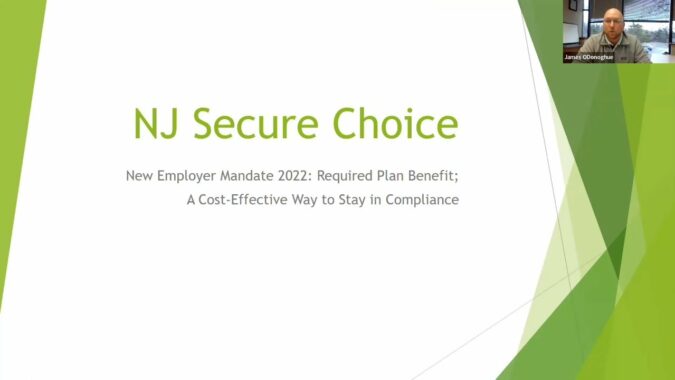In March, a new state law takes effect requiring businesses, including nonprofits, with 25 or more employees to offer qualified retirement plans to their workforce or face hefty fines for noncompliance.
At an NJBIA online seminar Tuesday, retirement plan consultant James O’Donoghue, of BCG Securities, discussed what the law requires and how business owners can save thousands of dollars while helping their employees save for retirement with a 401(k) plan specially designed for smaller employers.
The law requires any New Jersey employer who has been in business at least two years and had 25 or more employees during the prior calendar year to offer a qualified retirement savings plan. Similar mandates are already in effect in 14 other states and many others have pending legislation.
“All these laws and mandates are coming into effect because they recognize that there is a severe retirement savings crisis in this country,” O’Donoghue said. “The average 50-year-old has under $50,000 saved for retirement. That’s not enough for retirement. Pensions are not a thing anymore, so all of these rules are meant to encourage folks to save.”
O’Donoghue noted the fines for noncompliance with the New Jersey law will start at $100 per employee in the second year after the law takes effect and increase to $500 per employee by year five.
“The cost to run and operate a 401(k) plan is well under $100 an employee so it’s much more cost-effective to just start a 401(k) plan and give that benefit to your employees than it would be to wait,” O’Donoghue said. “As a business owner you also get significant cost breaks and credits to start a retirement plan – up to $4,000 in tax credits.”
Under New Jersey’s law, employers have the option of joining a state-sponsored retirement plan or a qualified private market plan. Yet with the law’s March 28 implementation date approaching, the state has provided few details on what the state-sponsored plan option will be or its costs, O’Donoghue said.
“They have given no real guidance on what their plan is going to look like, so that should tell you it’s probably not the best option to wait for the state to come out with a plan at the last minute and have the state run your retirement plan for you,” O’Donoghue said.
In the private market, major players such as Merrill Lynch, Morgan Stanley and Goldman Sachs require employer retirement plans to have at least $5 million in assets, which shuts out many small businesses. And while there are a limited number of financial service providers, such as Fidelity, Principal and Transamerica that will set up a retirement plan for a smaller business, there is another option for NJBIA members allowing them to pool resources to obtain a high-quality 401(k) plan at a lower cost.
“If you were to set up a 401(k) individually, you would face much higher costs, and generally not as great service because you are a startup plan with not too many assets in there … and you would be liable with all aspects of running the plan as the business owner,” O’Donoghue said.
The NJBIA Retirement Advantage Program is a Multiple Employer Plan (MEP) custom developed by the Employers Association of New Jersey to allow the collective members of both organizations to leverage the power in their numbers. Businesses get access to a customizable, fiduciary-managed plan that saves money on fees, audits, and HR time. The individual employers do not have to pay for annual audits, file form 5500 with the government, or buy fidelity bond insurance because the plan does all that for them.
“It provides good economy-of-scale pricing because you’re getting the group benefit cost of a $100 million plan, even though you’re just starting out, and best-in-class education for your employees and investment selections,” O’Donoghue said. “We are the fiduciaries on the plan, not only on the investment side but on the administrative side.”
For more information, the full video presentation can be viewed here. Information is also available on NJBIA’s website.

